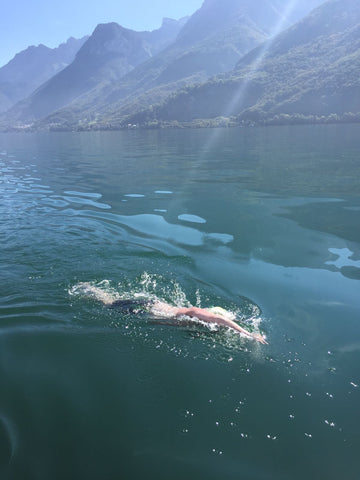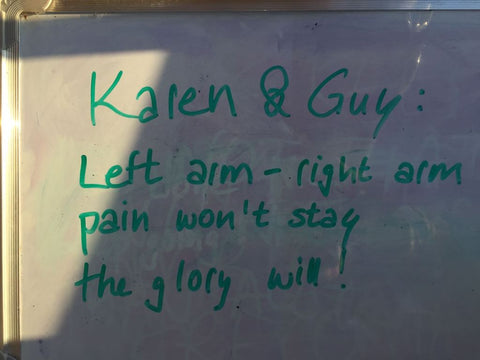Nutrition in Long Distance swimming: Bonker’s behaviour? – Nick Murch – #TeamSelkie
Posted on Thursday, December 05 2019 05:29:00 PM in News by Karen Lee
There is little less in endurance sport that divides opinion as much as the subject of nutrition. So I thought I would put my feelings down to enable others to benefit from what I have learned in my open water swimming and medical career to date. I have done three recognised extreme marathon swims and worked as medical support in the High Dependency Unit at the end of the London Marathon. Some of this may be controversial or against accepted thought, but then I’m all about a debate and there is no ‘one size fits all’ plan.

Basically the take home message is that there is no right answer, so you don’t need to read on. If you do I’ll use some science to make the point.
Most people use a carbohydrate gel or solution to feed whilst swimming long distances. These are usually composed of small molecules that provide rapid release energy but can cause the stomach to distend (causing nausea) and may have, in my opinion, laxative effects. Many distance athletes get “runners’ trots” (think a certain female marathon runner) and this may be due to excessive pure water consumption, the laxative effect of feeding agents and diversion of blood away from the bowels to the muscles. It is not dirty water that (usually) causes swimmers to develop gastrointestinal upset.
Some maths:
The body’s main stores for aerobic exercise are approximately (80kg man) (note carbohydrate and protein both store 4 calories / gram and fat 9 calories / gram)
Glycogen (carbohydrate) in liver: 120g = 480 calories
Glycogen in muscle: 350g = 1400 calories
Fat stored throughout body: 16kg (20 percent body weight) fat: 144,000 calories
Protein (can make up to 5 percent of energy requirements but not ideal to break down when exercising, so we will ignore)
Therefore there is only 1880 calories worth of carbohydrate stored in his body.
In extreme prolonged sport it is possible to use 700 to 800 calories per hour, but the maximum carbohydrate replacement intake is suggested at approx.:
Max<1gm/kg/hr– 60 to 90gms per hour so 240 to 360 calories per hour – let’s say 320 calories for an 80kg male.
Many people feed hourly or half hourly in long distance swimming. There is clearly a mismatch in intake versus exhausted calories:
Hour 1: 1880 cals to start, 800 cals exhausted, 320 cals taken in = 1400 calories
Hour 2: 1400 cals to start, 800 cals exhausted, 320 cals taken in = 920 calories
Hour 3: 920 cals to start, 800 cals exhausted, 320 cals taken in = 440 calories
Hour 4: 440 cals to start, 800 cals exhausted means 360 cals in deficit with max intake 320 calories… and the body must switch to an alternative fuel source.

This is where fat metabolism comes in to play. The body must break down fat stores to create energy, which may promote the development of molecules called ketones which can make the blood slightly acidic in some individuals. This can be uncomfortable if unanticipated and leads to the stage of an endurance event where one ‘hits the wall’ or ‘bonks’.
Simple carbohydrate ingestion may cause spikes in blood sugar levels and a reflex release of insulin, which blocks the body from breaking down fat, so those jelly babies or energy drinks may actually be hampering physical performance in the long term. Ways to minimise the ‘glycaemic rollercoaster’ may be to feed regularly small amounts or to have a more sustained released carbohydrate mixture.
I’m a big believer than we should train as we mean to fight – and so I spent several weeks on a low carbohydrate, high protein, high fat diet while preparing for my English Channel crossing (21 miles, 11 hours) and Lake Geneva traverse (69km, 32 hours). I would also train for up to 7 hours with just a coffee beforehand and the odd sugary treat every hour – clearly relying on my ‘bioprene’ to provide the majority of my energy whilst swimming.
Whilst on the subject of coffee, many people are either for or against caffeine during exercise. I, for one, have at least 5 coffees a day so if I didn’t have a caffeinated drink during a long swim I would likely get withdrawal symptoms. If naïve to caffeine then I would strongly advise against taking it during exercise.
On nutrient we cannot do without is water – the body needs 25 to 30 mls / kg/day maintenance hydration (i.e. when not exercising) so 2L to 2.4L for the 80kg athlete plus insensible losses (sweating, heat, water lost on extra deep breathing etc.). Hydration is key for prime athletic performance. East African marathon runners traditionally used tea as their means of hydration, and ran at approximately 2 to 3 percent dehydration as optimal offset of performance versus weight. Anything more than 5 percent dehydration causes a massive drop off in performance. Swimmers are less worried about weight due to relative buoyancy.
Pure water may cause problems too though, as salt (sodium) is also lost in sweat and replacement with pure water may cause a dilution of the blood which can cause problems with both physical performance and health. I personally do not subscribe to the argument that being in salt water will replace salt lost in sweat so I take an electrolyte supplement containing Potassium, chloride and magnesium (amongst others). There are some basic electrolytes in some of the branded carbohydrate drinks so read the label!
The main reason for a periodic feed is, in my mind, two fold. One is for a psychological lift to have some human contact, and to look forward to that placebo effect Jelly baby. One truly swims to the next feed in times of hardship. The other is for the crew to assess how you are performing and whether you are hypothermic, hallucinating etc.
The take home message is, to train as you mean to fight – train on empty and consider running ketogenic at times (not if you are diabetic – this can be dangerous). Keep feeding regimes, and hence your metabolism, versatile and do what works for you.



